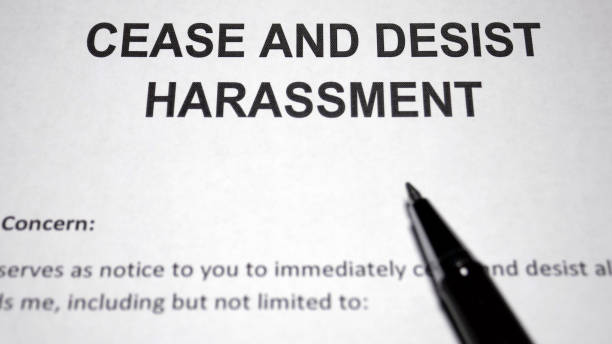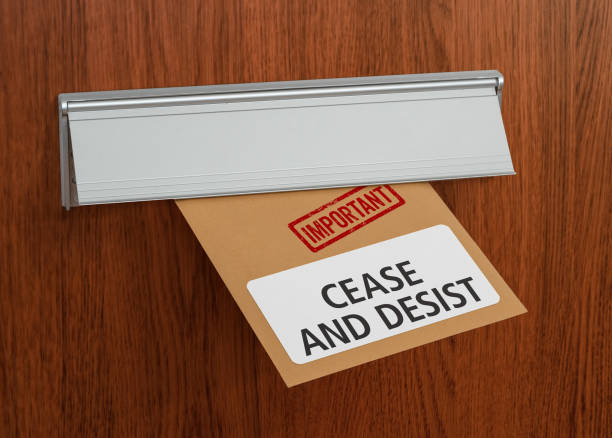A cease and desist letter restrains someone from conducting illegal activities. Generally, lawyers send a cease and desist letter to a party prior to litigation. A party sends a cease and desist letter to stop another party from engaging in illegal or harmful activity that represents the infringement of someone’s rights.
This article discusses relevant aspects related to a cease and desist letter. These include its purposes, various circumstances where it is used, and how to respond to a cease and desist letter if you receive one.
The Purpose Of A Cease And Desist Letter
It serves the following purposes:
- It alerts the defaulting party to their infringing or illegal conduct. Infringement is defined as a violation of some right.
- Notifies the defaulting party of the breach;
- It requires the party at fault to immediately cease and desist their activity or conduct;
- Warns the defaulting party of further court proceedings and action (like a damages claim) if they don’t comply.
When Is Are Cease And Desist Letters Used?
A party uses a cease and desist letter in circumstances involving a breach of contract, intellectual property infringement, infringement of other rights, defamation, or harassment.
Given below is a list of situations during which people seek a lawyer’s help to send a cease and desist letter:
- You have experienced copyright infringement. This also includes situations involving trademark infringement.
- Some parties are harassing you.
- Debt collectors are harassing you.
- Breach of contractual obligations.
- Someone has engaged in activity that has led to defamation or slander.
- General defamatory conduct that is harming you.
- You want to stop someone from partaking in general activity or conduct that is causing some kind of damage to you.
Interestingly, this letter has different names such as “Notice to Stop letter” or a “Demand letter.”

Explanation Of Situations When Such Letters Are Used
The section below provided a summary of common scenarios where people may use these letters. The following section will elaborate each scenario.
What is copyright infringement?
A person infringes copyright when he/she replicates someone else’s work. This happens when someone has created original content, and another party copies and uses same or similar content for their own benefit.
What is trademark infringement?
A person may own a symbol, word or mark which can be their individual or company’s trademark. When someone else uses the same mark it is called as trademark infringement.
Defamation
Parties use Notice to Stop letters in defamation cases. Defamation occurs when an individual makes false statements that damages your reputation, or your company’s reputation.
Defamation includes either false written (known as libel) or spoken (known as slander) statements.
Debt collectors
Debt collectors may be relentless in their attempts to contact you. They might call you many times and even visit your house.
A cease and desist letter can help stop this conduct of debt collectors. You can warn debt collectors of further legal action if they continue the behaviour.
Invasion of privacy
If someone tries to invade your privacy on multiple occasions, or if they are stalking you, you can issue the letter against them. It can be an effective way to stop the conduct as the prospect of legal action might prevent them from continuing this behaviour.
Harassment
The letter is useful in situations where someone harasses you or persistently annoys you or makes you feel uncomfortable. Importantly, the letter can be used as evidence during legal proceedings in Courts if the matter escalates.
Sending Or Responding To The Letter
How to send the letter?
You will need the help of lawyers to send a cease and desist letter to someone. You can fill out online templates available. However, these templates are not wholly reliable. The templates might fail to include important sections and information.
Your lawyer will have knowledge about everything that needs to be included in the letter. You and your lawyer can submit the letter either by email or by post.
The letter must contain information about the recipient, and also complete information about the ongoing dispute or issue between the sender and the recipient. Moreover, the sender must also clearly state their demands in the letter.
Receiving a cease and desist letter
In the event that you receive a letter, you must ensure that you follow the demands of the letter. This is a serious matter which can otherwise lead to legal action against you.
Legal proceedings can be expensive and time-consuming. Therefore, it is essential for you to follow the demands as stated by the sender.
Importantly, receiving the letter does not automatically indicate that the recipient is engaging in some illegal conduct. Even recipients must seek legal advice before taking any further action.

Why Should You Seek Legal Advice
In case you wish to loge a cease and desist order to someone, approach your lawyer and explain the dispute to them. This order has the legal power to stop illegal activity and will require a lot of legal steps. Hence, one must seek legal advice from experienced lawyers.
If you have received a letter, you must present your letter to your lawyer along with any other documents related to the claim. Moreover, you must provide accurate information regarding whether or not there was really an infringement.
You must provide a detailed background about the dispute to your lawyer. At JB Solicitors, our lawyers can gather all the information from you and provide you with a thorough plan of action.
Such events can be stressful and have legal consequences. This is why it is recommended that you seek progressional guidance if you want a cease and desist letter enforceable for various matters. For more enquiries, kindly contact our team of friendly solicitors.
